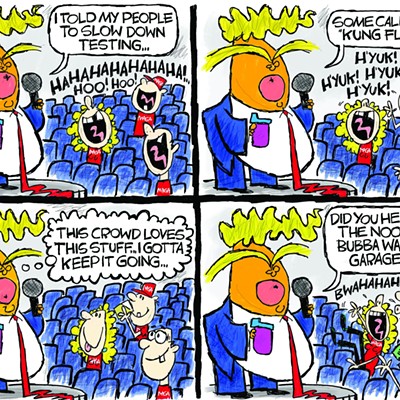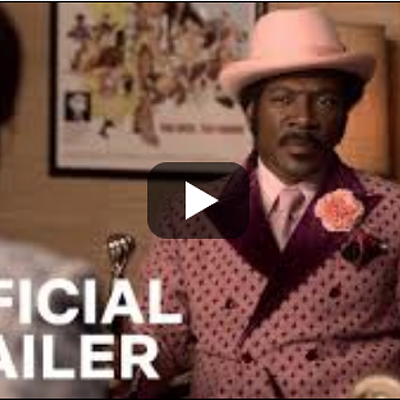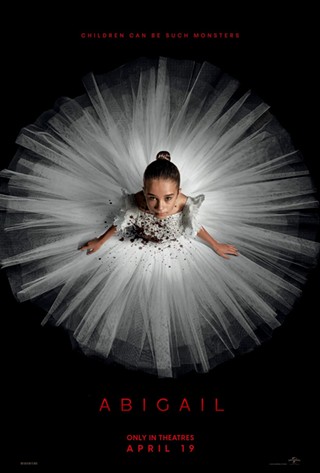What makes noir so special is that it casts a dim, shadowy, flickering light on the lonely everyman. Usually ... there's a few noirs that focus on the lonely everywoman, like Mildred Pierce, but last I checked, which was June of 1947, it was still a man's world. Of course, when you're sitting in the dim, shadowy, flickering light of a movie theater all by yourself, this is pretty much what you want to see.
Science fiction is interesting because it's the genre in which ideas are explored. This is obviously not true of the pseudo-sci-fi that George Lucas and the Defense Department put out, but in films like Metropolis, Shape of Things to Come and Lathe of Heaven the idea reigns supreme, more so, even, than the characters or story.
Because story is so important to noir, with its labyrinthine plots and dark character studies, it hasn't often been combined with sci-fi, though when it is we get such smashing films as Kiss Me Deadly, Blade Runner and Winnie the Pooh Always Rings Twice ... In Space! Now, finally, two of America's finest filmmakers, Joel and Ethan Coen, have put their four hands to a sci-fi/noir project, the almost painfully beautifully photographed The Man Who Wasn't There.
I'd like to say it was great, but when you're the Coen brothers, you're held to a painfully high standard, and Man Who Wasn't There doesn't quite reach the peaks of which they're capable. Still, it's so beautiful to look at that it doesn't matter, and where it combines the sci-fi love of ideas with its Postman Always Rings Twice-style plot, it's occasionally brilliant.
Billy Bob Thornton plays Ed Crane, the quintessential noir everyman. Ed's a barber who breaks his stony silence only to utter such desperate profundities as "This hair ... you ever wonder about it?" Usually, Billy Bob is so annoying that you want to sentence him to endless hours of lovemaking with Angelina Jolie ... no, waitaminute ... anyway, he's often just incredibly annoying on film, but in Man Who Wasn't There he completely restrains his tendency to emote. In fact, he maintains almost the exact same facial expression during the entire film. His chiseled bad looks are perfectly accentuated by the high-contrast, almost posterized lighting, and he becomes something of a set piece in a series of shots that exaggerate the best of '30s and '40s noir.
The story, too, is pure noir: Ed finds out that his wife is cheating on him with her boss, and he writes an anonymous blackmail letter in order to get enough money to start a dry-cleaning business. You heard me right, brother: dry cleaning. For a man who finds hair philosophically fascinating, dry cleaning is a like a trip to the moon: Imagine, he thinks, cleaning without wetness.
Of course, the plot goes horribly wrong, and the law is called in. This is where the movie kicks into high gear and science fiction.
Tony Shalhoub, who's such a good actor that most people will never hear of him, plays an attorney who's a bit too well versed in quantum physics. His defense strategy relies on the Heisenberg uncertainty principle, or as he puts it, "This Kraut said that there is no what happened, because the more you look the less you know."
The rest of the cast is equally excellent. There's Michael Badalucco (from TV's The Practice) as Billy Bob's barbershop boss, Francis MacDormand as his scheming wife, James Gandolfini (best known as Tony Soprano) as MacDormand's boss and lover, and Scarlett Johansson (Ghost World) as the symbol of innocence who fascinates Billy Bob when his life falls apart.
The real star of the movie, though, is cinematographer Roger Deakins, who's been nominated for four Academy Awards but miraculously missed winning any of them. If they don't give it to him for this film, well, then all my sacrifices to Baal will have been for naught.
Fans of the genre will no doubt enjoy Man Who Wasn't There, and anyone with a love of cinematography will want to see it, as it's a case study of what can be done with contrast and composition. The script is really the only problem with the movie, but it's enough of a problem to move it out of the range of the year's best films. While it's often archly funny or painfully apt, it has a tendency to go soft, as though it wished to defer to the image. When the script hits its mark, it hits hard, but when it misses it feels like a rote attempt at noir parody.
Still, if you're not busy standing in a shadowy doorway in an overcoat, smoking a cigarette and wondering where it all went wrong, you might find Man Who Wasn't There the perfect pick-me-up for this otherwise noirless season.













